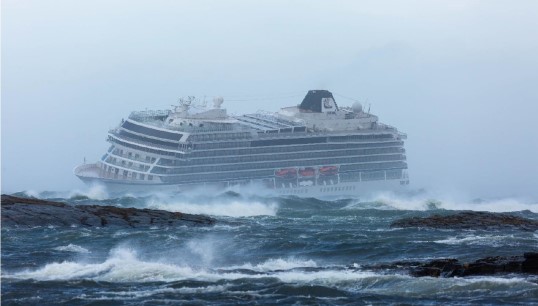- Topics
- Campaigning
- Careers
- Colleges
- Community
- Education and training
- Environment
- Equality
- Federation
- General secretary message
- Government
- Health and safety
- History
- Industrial
- International
- Law
- Members at work
- Nautilus news
- Nautilus partnerships
- Netherlands
- Open days
- Opinion
- Organising
- Podcasts from Nautilus
- Sponsored content
- Switzerland
- Technology
- Ukraine
- United Kingdom
- Welfare
Viking Sky near-grounding report: multiple recommendations after 'disaster' was narrowly averted
10 April 2024

An investigation into the near-grounding of a cruise ship, which experts warned 'had the potential to develop into one of the worst disasters at sea in modern times', has concluded that the vessel should not have been at sea because it was in breach of safe return to port requirements. Andrew Linington reports
In March 2019, the 47,842gt Viking Sky – which had 1,374 passengers and crew onboard – came within a ship's length of running aground after suffering a blackout and loss of propulsion and steering during a fierce storm off the coast of Norway.
A Norwegian Safety Investigation Authority (NSIA) report on the incident warns that shortfalls in emergency training resulted in a ‘time consuming’ process to recover power. Alarm overload is also highlighted, with engine control room crew members struggling to deal with up to 1,000 alarms – many of them non-critical – within the first 10 seconds of the blackout.
Investigators found that recovery from a blackout without a standby generator had never been drilled onboard and engineers 'were therefore faced with a situation they could not readily recognise and were not practised in managing'.
It took 39 minutes from the blackout until both propulsion motors were operational and the ship had sufficient power available to maintain between 1 to 5 knots ahead. During this time Viking Sky came within a ship's length of running aground despite the attempt to arrest its drift by deploying both anchors.
Design shortcomings
The NSIA concluded that the blackout occurred when all three operational diesel generators were shut down by protective systems as a consequence of low lube oil pressure. Low levels of lube oil in the sump tank combined with the effects of vessel motion in the stormy conditions meant the lube oil suction pipe opening was exposed to air, leading to a loss of suction – something that was also a factor in the loss of the US-flagged containership El Faro in 2015.
The fourth diesel generator was out of action because of a defective turbocharger and although repair work was scheduled, the report says passengers and crew had been exposed to an 'unacceptable risk' in the forecast weather conditions as the vessel did not have the redundancy required by the safe return to port regulations and 'it should not have departed Tromsø under the prevailing circumstances'.
The NSIA said shore-based management had failed to effectively bring the safe return to port rules into the scope of the safety management system and this meant there was a lack of adequate support for crew members making decisions onboard.
Everything from swimming pool temperature alarms to highly critical alarms sounded as the blackout occurred, with no variations in sound, pitch, timing or colour to distinguish priority
Investigators found that Viking Sky's lube oil sump tank design did not comply with SOLAS regulations and class rules and the Fincantieri shipyard's design process and Lloyd's Register plan approval process failed to effectively ensure the tanks met the requirement for safe operation under dynamic inclination.
The report notes that none of the five sisterships in the Viking Sky class had been provided with instructions on correct lube oil sump tank filling levels or alarm setpoints. Engineers' requests for information about recommended oil levels were not fully answered and no guidance was given until the Viking Sky incident occurred.
'The remote lube oil sump tank level monitoring system was complex, and the resulting onboard measurements were inaccurate and unreliable,' it adds. 'The engineering crew onboard Viking Sky had gradually lost confidence in the remote monitoring system. Since the level alarms were generated by the remote readings, the crew did not take the level alarms as a true indication of the actual level.
'The combination of economic considerations, underestimation of consumption, the lack of confidence in the remote tank monitoring system and the lack of instructions regarding the correct filling and alarm setpoints, probably resulted in the lube oil levels and alarm settings decreasing over time,' it points out.
'The safety issues related to lube oil level management observed onboard Viking Sky were likely the result of underlying organisational safety issues.'
The NSIA report makes 14 recommendations to improve safety, including action by the International Maritime Organization, owners, builders and class to improve compliance with SOLAS rules governing lube oil tanks, as well as procedures for lube oil level management.
Alarm overload
The report calls for Norway to work with the IMO to develop an engineroom alarm management performance standard and vividly describes the problems of alarm overload during the incident, as everything from swimming pool temperature alarms to highly critical alarms sounded as the blackout occurred, with no variations in sound, pitch, timing or colour to distinguish priority.
The 'almost constant' nature of alarms during routine operations leaves crew members with a 'reduced sensitivity' to them, it warns, and a lack of guidance on how to respond to them may lead to an increased risk of them being dealt with 'inappropriately'.
Tags
